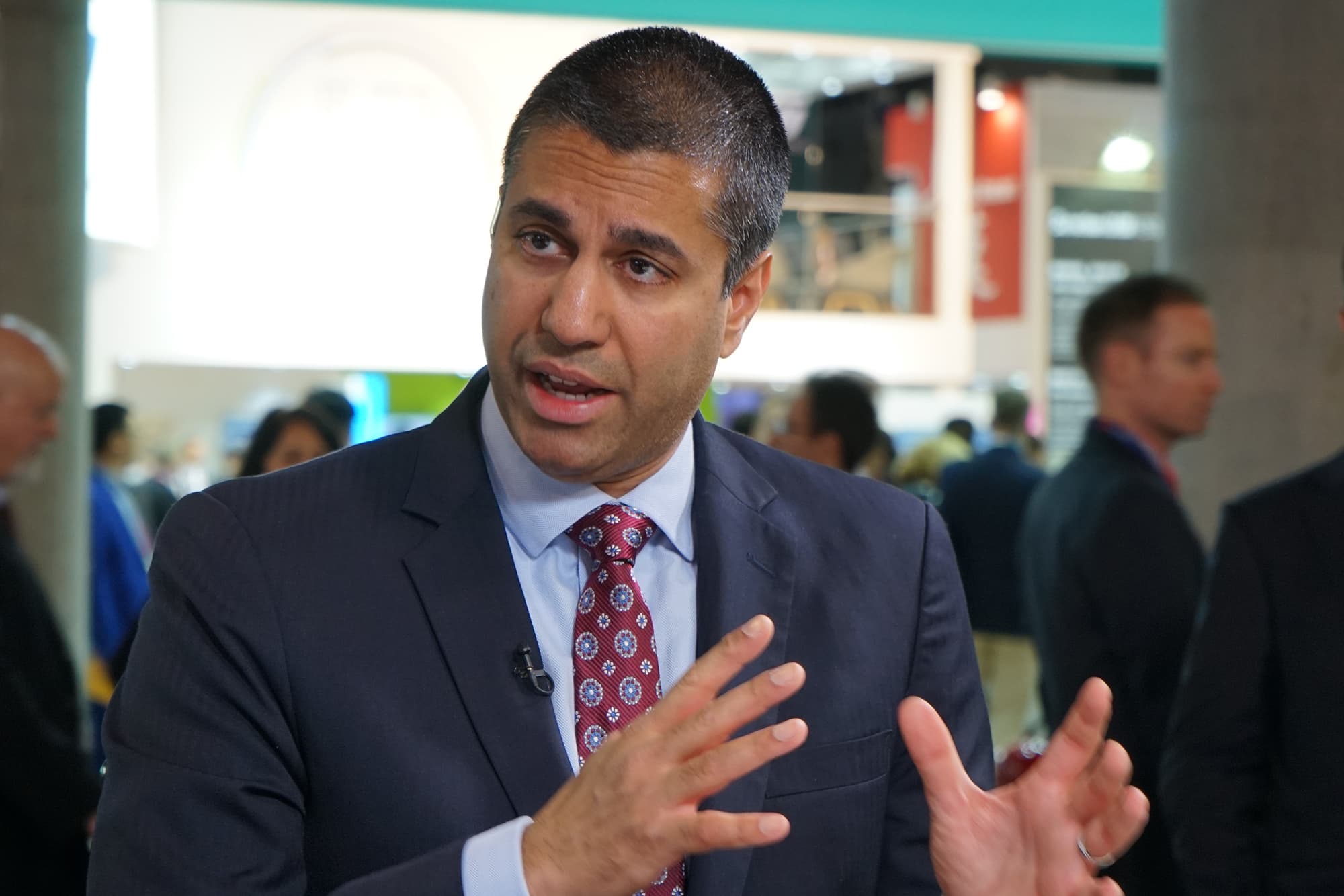Net neutrality foe and Trump’s former FCC Chairman Ajit Pai stands by repeal as Democrats take over

Ajit Pai
Brad Quick | CNBC
In one of his most memorable acts as chairman of the Federal Communications Commission during the Trump administration, Ajit Pai unraveled net neutrality rules formalized just a couple years before, shrugging off dissent from liberals and tech companies and facing personal threats to himself and his family.
Having departed the commission last week on the day President Joe Biden was sworn in, Pai said in a CNBC interview Monday that if given the chance, he would make the same decision all over again.
“I think time has shown that our decision was the right one,” he said.
Net neutrality rules were instituted in 2015 under the Obama administration in a bid to ensure that internet service providers (ISPs) would not be able to favor or cut off some internet traffic over others. Advocates said that without net neutrality, companies like AT&T, Charter Communications, Verizon or Comcast (owner of CNBC parent company NBCUniversal) would be able to speed up or slow down internet speeds for certain sites based on monetary incentives, potentially even from competing sites seeking to slow down rivals.
Pai called these sort of assessments “apocolyptic,” predicting “the end of the internet as we know it.”
“Fast-forward almost three years later, none of them have proven true,” he said.
It’s fair to say that net neutrality advocates’ worst fears have not yet materialized. Many parts of the internet are still free and and sites aren’t slowed at the behest of deep-pocketed competitors. The reason none of this has yet happened, however, is not clear-cut.
It’s been about three years since Pai and his colleagues repealed the rule, but the threat of a new administration turning it right back on again has not gone away. Not to mention that the public outrage sparked by the repeal process could be enough to keep many companies from directing such attention onto themselves.
To justify the success of the repeal, Pai pointed to faster broadband speeds, expanded internet access for Americans and capital investments by the ISPs in the years since. While some studies have found that the installment of net neutrality rules did not alter the level of network investment, Pai pointed to his FCC’s own findings of lower capital expenditures under the rule and the decision by U.S. Court of Appeals for the D.C. Circuit that upheld the repeal and largely deferred to the commission’s assessment of the landscape.
Conservatives like Pai and the ISPs themselves disfavored net neutrality because they saw it as a heavy-handed regulation unnecessary to address the purported issues. Net neutrality opponents also criticized the method used to achieve its aim, namely reclassification of ISPs from Title I to the more onerous Title II of the Communications Act of 1934, which also deals with price regulation of utilities, like telephone lines. Though net neutrality did not directly seek to regulate prices, opponents feared what they saw as a potential opportunity for overreach.
Even though the most dire warnings of net neutrality advocates have not yet been realized, some recent moves by ISPs have raised flags. In late 2020, Comcast said it would impose data caps on more of its home internet customers who weren’t on unlimited plans, a move that came as many have relied on even more home internet access than usual due to the pandemic. The announcement sparked cries from members of the Massachusetts state legislature, among others, who likened it to a “perversion of the principles of net neutrality.”
As some ISPs expand into content production, it’s raised further questions about how they can maintain an open and equitable internet with their own business interests at stake. AT&T, for example, said its internet customers could stream HBO, owned by its subsidiary, WarnerMedia, without counting it toward their data caps. Rival streaming platforms like Disney+ and Netflix, however, would not benefit from that same perk.
Pai said such a scenario “is a classic question of antitrust, not of the FCC preemptively making a determination.”
“Some might say the FCC should ban all types of practices like that, commonly lumped under the category of zero-rating,” he said. “But to me at least, it requires a highly fact-specific inquiry, which is more akin to what antitrust law would do.”
Pai said he would fully support legislation from Congress that enshrines the principles of net neutrality (like transparency and no blocking or slowing down speeds for certain services) without tying regulations to Title II. He said he wants to see the principles of openness applied through legislation to all areas of the internet, beyond just ISPs.
Section 230
Now, as public discussion of internet regulation has come to focus on social media platform’s moderation decisions — including recent ones by Facebook and Twitter to suspend former President Donald Trump from their platforms following the Jan. 6 Capitol siege — Pai has found what he sees as a peculiar parallel to that earlier debate.
“The very same people who were advocating so strenuously for so-called net neutrality have turned around and said to some of the tech giants and other platforms, ‘We actually want you to censor speech that we disagree with on the internet,'” Pai said. “And so it’s an interesting juxtaposition that I think has laid bare the hypocrisy of these so-called advocates, that not only were they looking for regulations in the form of net neutrality that essentially were solutions for a problem that didn’t exist, but now they’re compromising that core principle of internet openness to satisfy their own political impulses.”
This debate often comes up in discussions around Section 230 of the Communications Decency Act, the liability shield that protects online platforms from being held responsible for their users’ posts. It also allows them to take down “objectionable” content as they see fit without repercussions, allowing swift action by the tech companies on potentially harmful posts.
Trump charged the FCC with reexamining this statute in an executive order he issued last year shortly after Twitter moved to fact-check his tweets for the first time. About a month before the election, Pai announced the commission would start the rulemaking process to clarify the part of the law granting platforms broad immunity after the FCC general counsel determined it was within its legal authority to do so.
That effort may not go far or at least in the direction it might have now that the FCC’s leadership has changed to Democratic hands. Though there is bipartisan desire to reform Section 230 in Congress, the reasons vary greatly. Democrats generally hope to give tech platforms greater responsibility to weed out hate speech and illegal content while Republicans seek to stop what they see as biased moderation of conservative voices, in which the companies have denied engaging.
Pai said that he prided himself in maintaining the FCC’s independence as an agency and did not experience pressure from the White House when determining whether to initiate the rulemaking.
“When I announced that we were looking at this issue, we didn’t say we’re going to grant the petition, we didn’t say we’re going to examine every aspect of the petition,” Pai said, referencing the petition for the FCC to pursue the rulemaking from the National Telecommunications and information Administration (NTIA). “What we did say is we would start a conversation, a rulemaking in the parlance, examining the immunity provision within Section 230. What do those terms mean, things like ‘good faith’ and ‘otherwise objectionable.'”
Pai said he’d like to see more transparency from the tech platforms so consumers can plainly see how moderation decisions get made and by whom. The platforms already post their policies publicly and tend to explain major decisions after the fact, though consumers, lawmakers and even their own employees have complained of a lack of consistency.
Pai said he’s not at the point of advocating, as both Trump and Biden have, for the repeal of Section 230. He recognizes such a drastic measure could have unintended consequences, including potentially incentivizing the tech platforms to make their services more restrictive. Without Section 230 protection, platforms may fear they could be held accountable for inadvertently hosting illegal content if they don’t take more proactive action.
He also reiterated an earlier comment that he “wasn’t going to second-guess” Facebook and Twitter’s decisions to suspend Trump’s accounts in the wake of the riot at the Capitol. Still, he said, more transparency around the process would have helped consumers understand how that case differed from others where accounts were not suspended.
While Pai’s legacy is likely to be remembered largely by the net neutrality repeal, he said he’s also proud of other accomplishments the FCC made during his time as chairman. Pai established the Keep Americans Connected Pledge early in the pandemic to get broadband providers to commit to keeping Americans online as the crisis began, even as many consumers experienced financial hardship. Pai also steered the FCC as it prepared for the roll-out of 5G, including by auctioning off mid-band spectrum to wireless providers.
One initiative Pai hopes will have an impact far beyond his tenure is the implementation of 988 as a three-digit national suicide prevention and mental health hotline. The number is set to become fully active nationwide in July 2022.
“This has been a very difficult time for our country, of course, during the last ten months of the pandemic, and I think it’s only underscored some of the mental health challenges that millions of Americans are going through,” he said. “And I do hope that when that number is made active for everybody, we’ll be better able to connect those who were struggling with those who are trained to help at the National Suicide Prevention Lifeline. And that decision we made will save thousands of lives, I’m quite confident of that.”
Disclosure: Comcast is the owner of NBCUniversal, parent company of CNBC.
WATCH: FCC Chairman Ajit Pai on Section 230, 5G and the Biden administration

